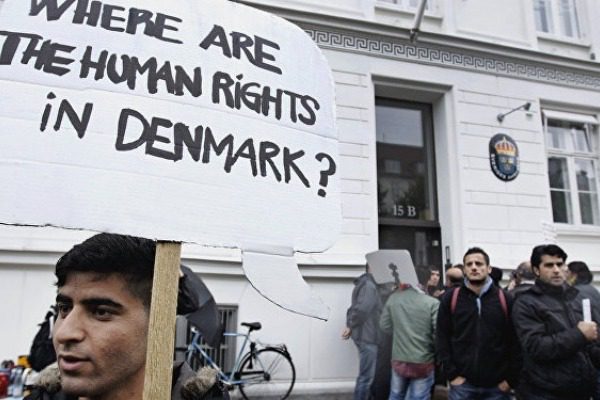They should give daily report
Denmark is considering relocating unwanted migrants to a small and isolated island. To this day on the island there are workshops, stables and a crematorium of a center that examines communicable animal diseases.
The New York Times comments that one of the two ships connecting the island is called VIRUS. "They are unwanted in Denmark and they will feel it," Immigration Minister Inger Stojberg wrote on Facebook.
On Friday, the government announced plans to resettle about XNUMX people on Lindholm Island. These are foreigners who have been convicted of crimes and rejected asylum seekers who cannot return to their homelands. The tiny Baltic island is two miles off the coast. Its connection is not regular. Foreigners will have to report daily and if they do not, they will face imprisonment. "We will reduce the ship's routes as much as possible," said Martin Henriksen, spokesman for the Danish People's Party on immigration. "We will make it as cumbersome and expensive as possible."

It is estimated that about $ 115 million will be allocated for infrastructure on the island to be inaugurated in 2021. The Minister of Finance, Kristian Jensen, stated that the island is not a prison but added that anyone who lives there should sleep on it. For her part, Loise Holck, deputy executive director of the Danish Institute for Human Rights, said her organization was following "very closely" her case for possible breaches of Denmark's international obligations. The agreement was concluded during the state budget negotiations. Every year the Danish People's Party demands additional restrictions on refugees and immigrants in order to vote in favor of the budget.
The government is committed to bringing immigration law to the limits of international human rights treaties. Legal experts say it is too early to diagnose whether the project will exceed these limits, and staying there will be an illegal restriction. However, they reported that a similar initiative by the Italian government clashed in 1980 with the European Court of Human Rights. Lindholm is promoting the government's policy of wanting rejected asylum seekers to leave the country as their lives have become difficult.
Asylum seekers with a criminal record do not have the right to work in Denmark. Rejected asylum seekers who cannot be deported are provided with accommodation where they are not allowed to prepare their own meals and are provided with an allowance of just over one euro per day withheld if they do not cooperate with the authorities. Former Immigration Minister Birthe Ronn Hornbech called the plan a "farce" and compared it to an own goal. "Nothing will be implemented from this proposal," he wrote.
Many rejected asylum seekers cannot return to their homelands for fear of abuse or persecution, or simply because their countries do not accept them back. Hundreds of people in Denmark's two deportation centers are refusing to leave with the government pledging to get rid of those who do not have a legal right to stay in Denmark. Many remain there for a decade despite increasingly unfavorable living conditions. An independent study by a former prison commander who now works for the Helsinki Observatory has shown that conditions can be compared to those in prisons, if not worse.
Prime Minister Lars Lokke Rasmussen said last month that the government's goal in receiving refugees would no longer be to integrate them, but to receive them until they could return to their countries of origin. "It is not easy to ask families to return home if they have actually settled," he said at a party meeting. "It simply came to our notice then. "We must not make refugees immigrants."
This summer, the ban on the face covering, also known as the "burqa ban", was voted in favor as a debate over the Islamic dress that some consider "non-Danish" followed. This month, parliament is expected to pass legislation requiring immigrants seeking citizenship to shake hands with officials as part of a naturalization ceremony, although some Muslims insist they cannot shake hands with a person of the opposite sex. The government claims that the handshake is a "basic Danish value".
